Swiss mull new Libya hostage strategy

A high-profile media campaign, foreign help, sanctions or quiet diplomacy – speculation is rife on how Switzerland should resolve its diplomatic tussle with Libya.
After a 60-day deadline for normalising relations between both countries ran out last week, the Swiss government’s new strategy for securing the release of two Swiss businessmen from Libya remains cloaked in mystery.
Swiss Foreign Minister Micheline Calmy-Rey has accused Libya of “kidnapping” the two men, who have been prevented from leaving Tripoli for some 15 months during a row over the July 2008 arrest in Geneva of one of Libyan leader Moammar Gaddafi’s sons. Libya rejects the abduction charge.
For Emmanuel Altit, the lawyer of five Bulgarian nurses who were held in Libya for eight years over a controversial HIV infection case, the solution is easy.
“Switzerland has to get itself out of the trap into which it has fallen, which has turned it into the main actor,” he told swissinfo.ch. “The hostages and their families should take centre stage. And this should be part of a global strategy to raise media awareness, mobilise the general public and put politicians under pressure.”
Public stance
On Wednesday Bruna Hamdani, the wife of Swiss businessman Rachid Hamdani being held in Libya, appeared for the first time on national television on the French-speaking current affairs talk show Infrarouge.
Hamdani said she would be willing to take a public stance and planned to seek “specialist advice”.
“I am ready to meet the entire Gaddafi family, if necessary,” she said. “I can understand that their honour was affected and they have something to reproach us for, but our husbands had nothing to do with all that.”
During the programme, Jean Ziegler, a Swiss expert on Libya and member of the United Nations Human Rights Council Advisory Committee, said Switzerland should lodge an official complaint at the International Court of Justice in The Hague for violation of the Vienna Convention, which sets out agreed diplomatic protocols between states.
Christian Democrat parliamentarian Luc Barthassat, a member of the foreign affairs committee, said it was time to up the ante and consider economic sanctions and Schengen visa restrictions.
“The Gaddafi family is very sensitive to this,” said Barthassat. “Tripoli-Paris return flights, for example…we could veto that.”
Third-party support?
At a press conference in Bern last week Calmy-Rey, the foreign minister, dropped her usual diplomatic cool, referring to “kidnapping”, “abduction” and “flagrant violation” of international conventions.
Despite talking tough there was no mention of sanctions or details of Switzerland’s future strategy.
But observers sense changes are afoot. For more than a year Switzerland has been isolated internationally over the diplomatic spat. During the past week, however, two nations have spoken publicly about the row.
The United States ambassador to Bern, Donald Beyer, said in an interview on Tuesday with a Swiss newspaper that the US was “concerned” over the two missing Swiss businessmen and “would welcome their return”.
Beyer stopped short of offering US assistance in the matter, however.
Last week Spanish Foreign Minister, Miguel Angel Moratinos, also indicated that Spain might be willing to mediate.
Moratinos said Spain, which takes over the European Union rotating presidency in January, enjoyed good relations with both Bern and Tripoli.
The Organisation of the Islamic Conference (OIC), of which Libya is a member, has also said that, while favouring a bilateral resolution, it would be willing to mediate if both sides requested it.
Not isolated
The government would not comment on these offers but has said previous attempts at third-party negotiations had been unsuccessful. The Libyans have said the matter must be dealt with bilaterally.
Christian Democrat parliamentarian Kathy Riklin told the Tages-Anzeiger newspaper Switzerland should “seize any ray of hope” but said a breakthrough was “still difficult”.
Hasni Abidi, director of the Study and Research Center for the Arab and Mediterranean World in Geneva, said that while the OIC proposal was actually a “declaration of availability, nothing more”, the recent offers show that Switzerland is “not as isolated as all that”.
“The most recent press conference by the three Swiss cabinet ministers and the change in tone, together with public statements by the families of the hostages have been seen by western governments as a green-light to express themselves,” he said.
Switzerland has several cards still to play, added Abidi.
“Libya is not ready to go back to the dark days of the embargo and its status of international pariah, nor to undertake an international enquiry,” he said.
Simon Bradley, swissinfo.ch
July 15, 2008: Hannibal Gaddafi and his wife Aline are arrested at a Geneva hotel after police receive reports that they have mistreated two servants.
After two nights in detention, the couple are charged with inflicting physical injuries against the servants. The Gaddafis are released on bail and leave Switzerland.
July: Two Swiss nationals are arrested in Libya. Swiss businesses are forced to close their offices and the number of Swiss flights to Tripoli is cut. Bern forms a task force and sends a delegation to Libya.
January 2009: Talks are held in Davos with Seif al-Islam Gaddafi, one of the Libyan ruler’s sons. A diplomatic delegation travels to Tripoli.
April: Hannibal and his wife, along with the Libyan state, file a civil lawsuit against the Geneva authorities in a Geneva court.
May: Foreign Minister Micheline Calmy-Rey visits Libya, reporting “significant progress”.
June: Libya withdraws most of its assets from Swiss bank accounts.
August: Merz, who meets the Libyan prime minister but not Gaddafi, apologises in Tripoli for the arrest. Swiss appoint arbitrator for international tribunal.
September: Libya does not let the two Swiss nationals leave the country, breaking a promise made to Merz that they would be free to return to Switzerland before September 1. Libya names its representative for the tribunal. Gaddafi and Merz meet on the sidelines of the UN General Assembly in New York. Two nationals disappear after undergoing a medical check-up in Tripoli.
October: A Swiss delegation returns empty-handed from Tripoli. A 60-day limit for normalising relations between Switzerland and Libya passes with no sign of the two Swiss hostages held by Tripoli. The Swiss cabinet expresses irritation over Libya’s “systematic refusal” to implement agreements between the two countries.

In compliance with the JTI standards
More: SWI swissinfo.ch certified by the Journalism Trust Initiative

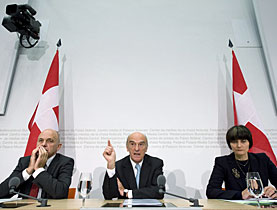
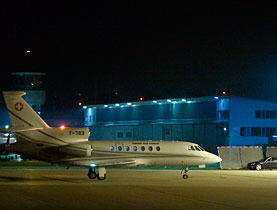
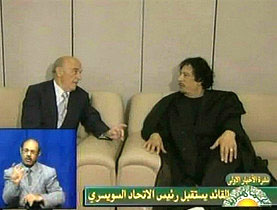
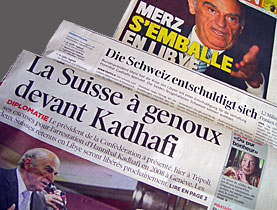
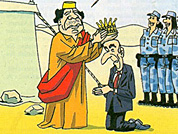
You can find an overview of ongoing debates with our journalists here. Please join us!
If you want to start a conversation about a topic raised in this article or want to report factual errors, email us at english@swissinfo.ch.